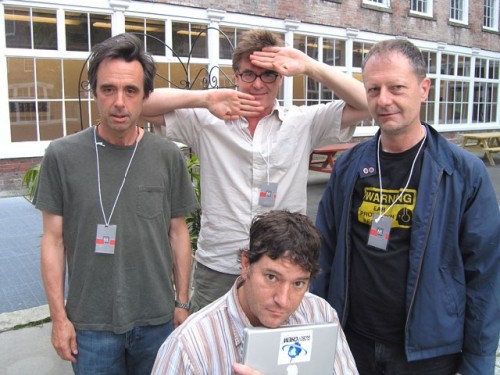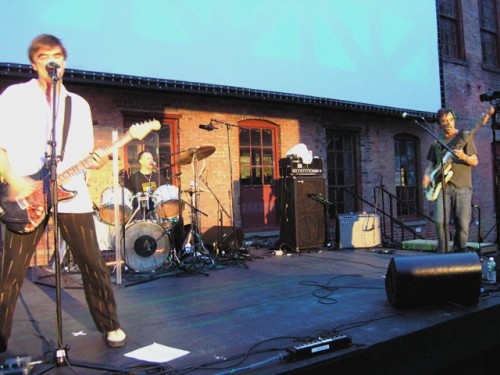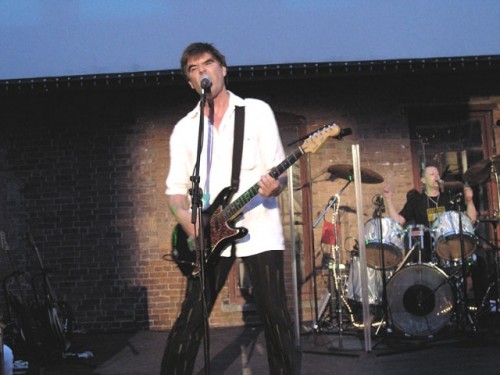Mission of Burma at Mass MoCA, Sat. July 1, 2006
By: Jane Hudson - Aug 25, 2006
What is the Boston sound? You have to reach back to James Mongomery (also appearing in the Berkshires this weekend), J. Geils Band, and the more poetic Willie 'Loco' Alexander to get a sense of the raw, garage-y guts-and-thunder kind of rock Bostonians like. You can reach back even further to Hendrix and the Stooges to find links. But in the late 70's something happened that changed the coloration, the aesthetic and ultimately the direction, and that was 'art punk'. Eric Van, baseball savant and MOB (Mission of Burma) devotee, argued during intermission that it was the emergence of La Peste, The Girls, Human Sexual Response, the Maps and the Rentals (Jeff's and my old band), among others, that came out of the art schools in Boston that changed everything. Combined with the British Punk invasion of bands like the Sex Pistols, Siouxsie and the Banshees, and the Clash, the possibilities for invention and the violation of traditional song forms opened up.
This was the soil into which Burma was planted. Roger Miller, previously a contemporary music student, Clint Conley, itinerant bass player on the Boston scene, Peter Prescott, local power drummer and Martin Swope, sound engineer and tape loop specialist came together to create one of the most original bands ever to come out of Boston. What they produced defied the known categories. They were 'experimental' in their use of atonal passages of Miller's guitar and yet grounded by the melodic inclinations of Conley's rhythm tracks. Prescott's drumming and crazed vocals combined with the wizardry of Swope's electronic interventions drove the pitch of the band's presence into frenzied dimensions.
The history is deep, and if you're a committed fan, you'll seek out the Wikipedia page
< http://en.wikipedia.org/wiki/Mission_of_Burma> and learn all there is to know. What we're talking about now is the experience of the Mass MoCA performance. Jeff and I were accompanied by Steve and Jan Nelsen (he's the president of the new 'MM/one', Music Museum of New England, which is about to be launched on the web and television). This was July 4th weekend and the beginning of summer with an outdoor show. The line-up is the same except for Bob Weston who is the new sound meister. Roger Miller on guitar, Clint Conley on bass and Peter Prescott on drums. Straightforward power trio, right? Not quite! They put out a huge sound, pushing the volume and the chordal potential of the instruments through an old Marshall amp and a big bass cab. Sometimes cacophonous, sometimes thunderous, always richly textured, the songs, both new and old, rang through the old mill complex like an industrial cleaner. No cobwebs left there!
They played a total of 27 songs in two sets, a gargantuan task for 50-something guys. There was never a sense of flagging energy, however, and in fact, they seemed to grow more and more comfortable and crazy as the evening progressed. The first song. 'Mica' introduced the band's complex beats, radically 'noisey' guitar, and wall-of-sound presence. Although somewhat ragged, it set the stage for the dark and passionate railings of 'Donna' and the inspired punk insistence of 'Peking'. Alternating vocal focus between Miller and Conley, with some inspired incursions by Prescott (great sense of humor and wild verbal assaults), gives the band its range of style. Sometimes cerebral and challenging as in 'Spider's Web' and '1001 Pleasant Dreams', and alternately accessible and harmonic in '2wice' or the great 'Academy Fight Song', the affect is to keep the audience from becoming passively entertained. One must pay attention! The tension of intentions of each musician is always in a dynamic state of dissolution and resolution, coming together and falling apart. One senses this as the ongoing creative process that keeps the band's members interested in each other, and continually productive after nearly 30 years of association. The songs from 'Obliterati', their most recent release on Matador Records, are as persuasive and relevant as their first attempts on Vs. (Rykodisc, Rick Hart, Prod., 1982). 'Trem II' is as bizarre and riveting as is the recent 'Careening with Conviction'.
The second set found the audience pressed against the stage in 'mosh' density (they didn't mosh, but there was dancing and fist thrusting excitement). Clint remarked about the transformation. Of course, this gave the band a spurt of energy which they explored brilliantly in 'Let Yourself Go' and 'Max Ernst'. In 'Wounded World' I heard something of the Irish soul that is also part of the legacy of this Boston group. Passionate, mournful, ferocious and resigned. Of course, the anthem 'That's When I Reach For My Revolver' ended the set with this timely and heart-felt message. Never forget!!!
I heard everyone from Ric Ocasek to John Doe, Johnny Rotten to David Byrne, Fred Schneider, even Jello Biafra and . What comes through is that every era has its particular 'psyche', and that manifests in the body of the parties, in their sound, in their politics, and is deeply specific. This creates a sense of the authentic, something that can never quite be simulated, although many have tried. What makes MOB special is that they were progenitors of so many directions that music would take, post-punk, No Wave, Noise, alternative 'indie' rock, even grunge. And they continue to make such a significant contribution. Just look at their audience. It's quite young although peppered with a few gray-hairs. People know 'it' when they see it.
The band's encores ended under a crescent moon, with a song called 'Good Not Great'. What a way to end such a spectacular night, with humility, and a sense that better things are yet to come.
Photos: Jeff Hudson



